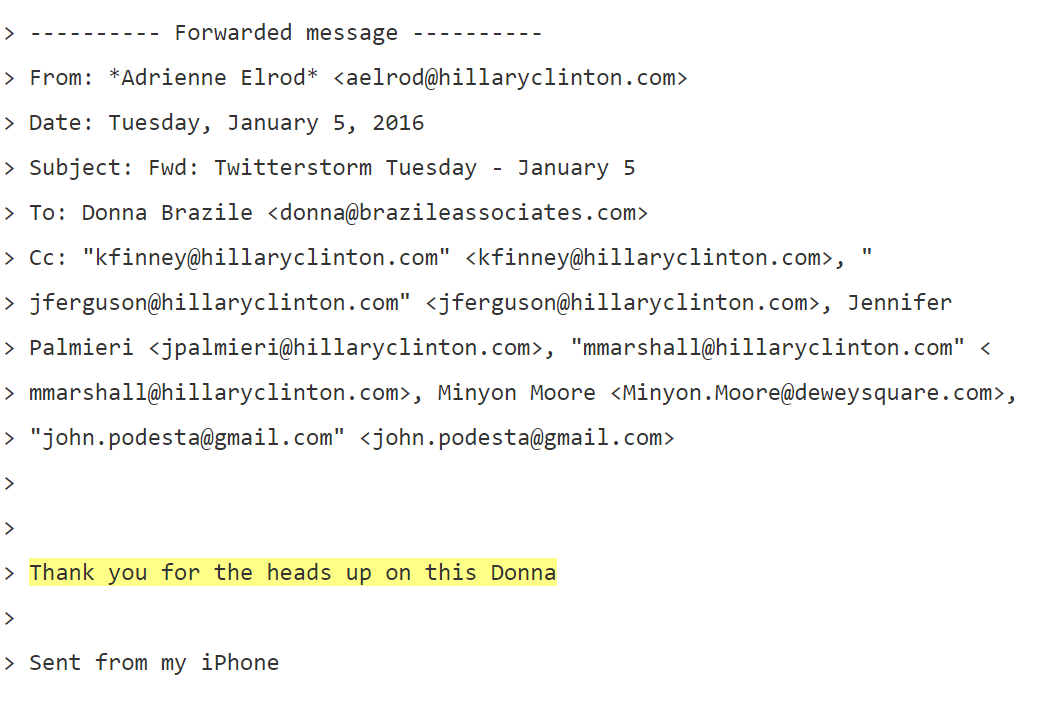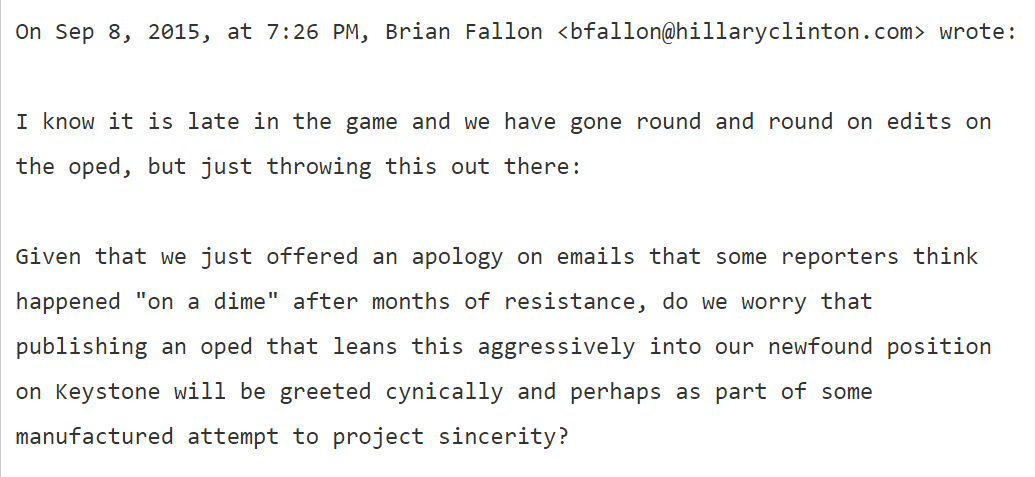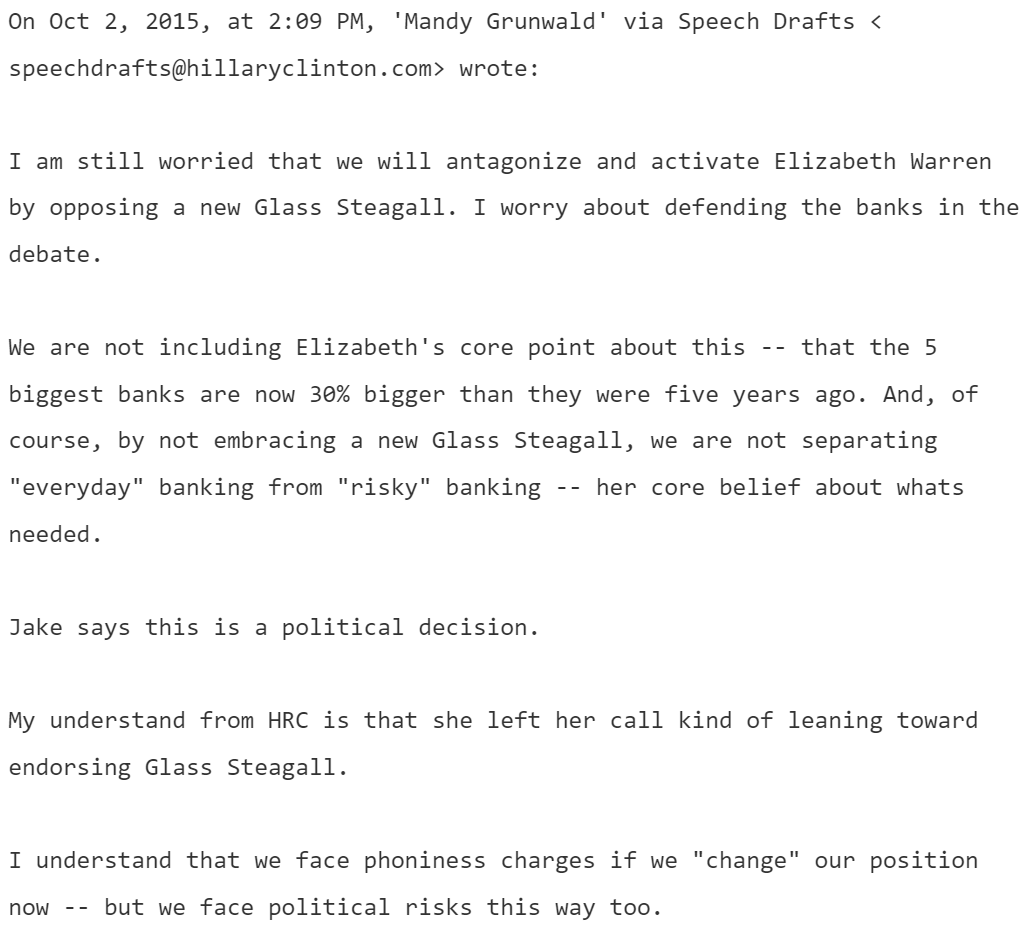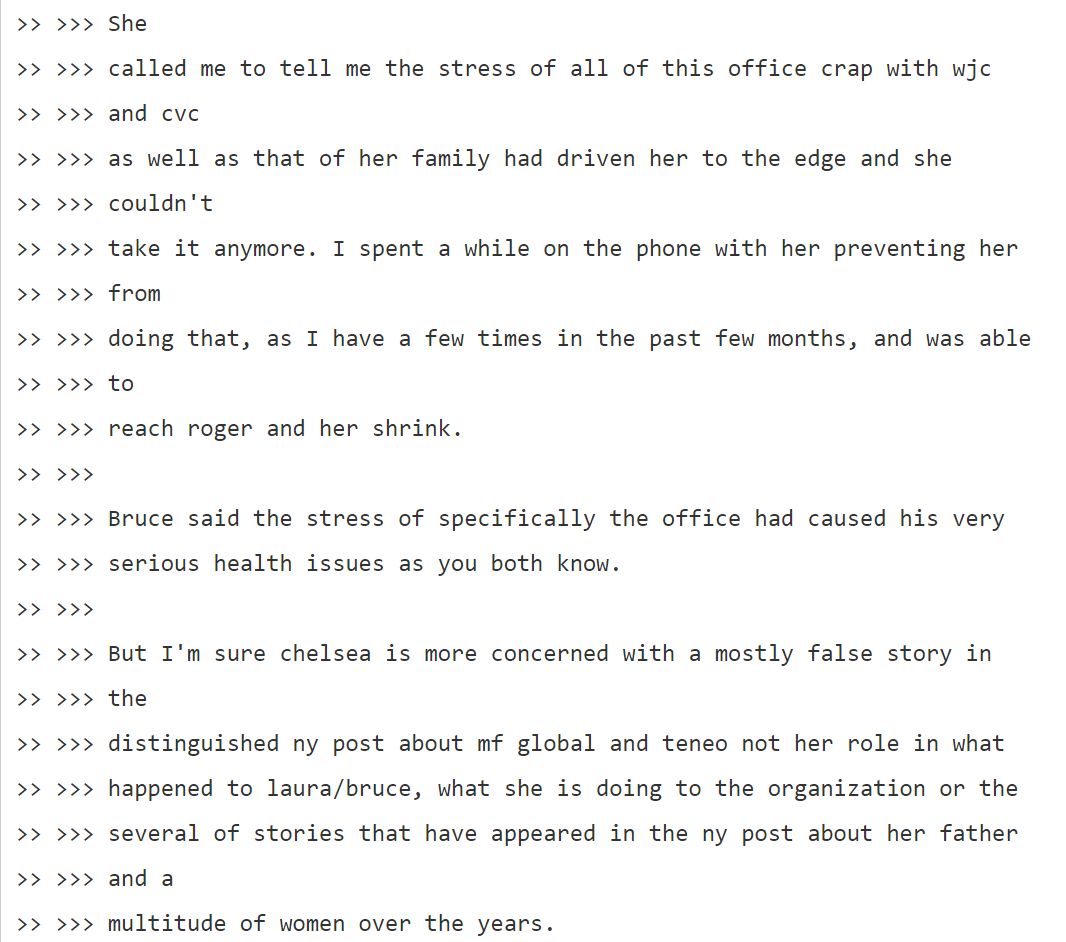A second batch of emails obtained illegally from the inbox of John Podesta, Hillary Clinton’s campaign chair, offered fresh insight Monday into her team’s handling of the biggest liabilities facing her campaign.
The 2,086 emails, released Monday by WikiLeaks, brought the total number of records published through the hack to more than 4,000. Emails posted Friday by the same site contained 77 pages of excerpts from Clinton’s most controversial paid speeches.
Clinton dodged a question Sunday evening about the inconsistencies in her political positions that were revealed late last week when WikiLeaks published its first trove of Podesta emails.
During the second presidential debate, Clinton focused mainly on the alleged hackers who infiltrated Podesta’s inbox, rather than the contents of the emails within it.
“Our intelligence community just came out and said, in the last few days that the Kremlin … are directing the attacks, the hacking, on American accounts to influence our election,” she said.
“The Russians hack information, we don’t even know if it’s accurate,” Clinton added. “Believe me, they’re not doing it to get me elected.”
WikiLeaks claims to have taken as many as 50,000 emails from Podesta’s inbox, dating back to the 2008 campaign. The insight provided by his emails was largely eclipsed by the firestorm of criticism that followed the release, just hours earlier, of footage capturing lewd comments Donald Trump made to an NBC host in 2005.
Here are 14 revelations contained in the Podesta emails.
‘They Can’t Possibly Vet All Those Refugees’
Clinton told an audience at a luncheon for the Jewish United Fund Of Metropolitan Chicago Vanguard in Oct. 2013 that the flow of Syrian refugees into Jordan had put that country’s security at risk.
“There’s a discussion going on now across the region to try to see where there might be common ground to deal with the threat posed by extremism,” Clinton said, according to paid speech transcripts included among Podesta’s emails.
“And particularly with Syria which has everyone quite worried, Jordan because it’s on their border and they have hundreds of thousands of refugees and they can’t possibly vet all those refugees so they don’t know if, you know, jihadists are coming in along with legitimate refugees,” she said.
Clinton has called on the U.S. to accept 65,000 Syrian refugees, a dramatic increase from President Obama’s proposal of 10,000.
While critics of the administration’s refugee policy have pointed to inadequacies in the vetting process, Clinton has staked her position on the assumption that U.S. officials have the resources to screen incoming Syrian refugees effectively.
Team Clinton feared Rubio
Emails suggest Clinton’s closest aides were concerned about facing Republican Sen. Marco Rubio in the general election, fearing he could pose the greatest threat to her White House ambitions.
“He gives a good speech, and sounded much more reasonable, populist and accessible than much of the rest of the GOP field. Felt more like an inspiring Democratic speech than a GOP candidate,” wrote a communications aide in April 2015.
A conversation from July of that year shows senior members of Clinton’s team agonized over what to tweet at Rubio in response to his criticism of the administration’s moves in Cuba.
In May 2015, Clinton’s campaign staff dialed back a proposed attack on Iowa Rep. Steve King’s hardline immigration proposals in order to draw a sharper contrast with Rubio and Jeb Bush.
“[T]he question… is whether hitting King takes away from our effort to get a clean contrast with Bush/Rubio et al. They would also attack King, so it sort of lets them off the hook,” Sullivan wrote to a group of campaign aides as they ironed out wrinkles in an upcoming immigration speech.
In Oct. 2015, Podesta and other campaign aides discussed ways to use Rubio’s absence from the Senate as an attack line against him.
An email sent from a liberal columnist to a Clinton ally in March 2015 revealed fears among her supporters that Clinton was “almost totally dependent on Republicans nominating Trump,” suggesting any of the other GOP primary contenders, including Rubio, could have defeated her in a general election.
New DNC chair gave Clinton camp ‘heads up’ on Sanders plans
Donna Brazile, acting head of the Democratic National Committee, tipped off the Clinton campaign to Sen. Bernie Sanders’ plans to launch an education-themed “Twitterstorm” run by his African-American outreach team in January.
Brazile was then vice chair at the DNC.

Adrienne Elrod, a Clinton campaign spokesman, thanked Brazile for the “heads up.”
Brazile ascended to her present position when her predecessor, Rep. Debbie Wasserman Schultz, was felled by her underhanded attempts to boost Clinton over Sanders. Those efforts were revealed in July through a separate tranche of WikiLeaks documents taken from the DNC.
Syrian no-fly zone
During the second presidential debate Sunday evening, Clinton expressed her support for a no-fly zone over parts of Syria as an approach to the humanitarian crisis unfolding in that country.
However, in a speech paid for by Goldman Sachs in June 2013, Clinton expressed skepticism that the tactic could ever work in Syria.
“But the idea that we would have like a no fly zone—Syria, of course, did have when it started the fourth biggest Army in the world. It had very sophisticated air defense systems. They’re getting more sophisticated thanks to Russian imports,” Clinton said, according to leaked speech excerpts.
“To have a no fly zone you have to take out all of the air defense, many of which are located in populated areas,” she added. “So our missiles, even if they are standoff missiles so we’re not putting our pilots at risk—you’re going to kill a lot of Syrians. So all of a sudden this intervention that people talk about so glibly becomes an American and NATO involvement where you take a lot of civilians.”
Most Clinton Foundation donors aren’t American
In a speech delivered to Mediacorp in 2013, Clinton admitted that the largest share of donations to the Clinton Foundation came from outside the U.S.
“Canadians per capita are the biggest supporters of the Clinton Foundation and the Clinton Global Initiative, so it’s great to be supported by so many Canadians,” Clinton said.
Transcripts show Clinton spoke frequently and affectionately of her family’s foundation and some of its largest donors, such as Bank of America and Gap, Inc.
Keystone pipeline
Emails show Clinton’s staff struggled on how to handle her past support of the Keystone Pipeline, which came under review at the State Department while she was secretary of state.
For example, one exchange from April 2014 showed Podesta advised writers to remove a passage expressing optimism about the Keystone Pipeline project from Clinton’s book, “Hard Choices,” which was then heading for production.
“The Secretary is open to cutting and thinks maybe we’ll add a few more lines on the promise of clean energy instead,” wrote Dan Schwerin, Clinton’s speechwriter, in response.
Robby Mook, Clinton’s campaign manager, worried that reports linking payments from Keystone-backing firms to Clinton’s husband would draw the ire of “enviros” in April 2015.
“Have we discussed when she will come out against Keystone? After POTUS vetoes?” Mook asked Jake Sullivan, a senior campaign adviser.
Clinton announced her opposition to the Keystone Pipeline in Sept. 2015.
Shortly after she did so, Brian Fallon, a campaign spokesman, referred to her stance as a “newfound position on Keystone.”

Fallon voiced concerns that publishing an op-ed about Clinton’s opposition to the Keystone project could create the “perception that she is putting a finger to the wind.”
In Aug. 2015, Mook suggested unveiling Clinton’s stance on Keystone as a way to change the conversation away from her email scandal.
“We could even have her come out against Keystone…which will solicit criticism but that might help distract from emails,” Mook wrote to a group of high-level campaign staffers.
Clinton’s campaign planned distractions from email scandal
Emails suggested Clinton’s staff discussed ways to divert attention from the controversy brewing over the former secretary of state’s use of a private email server.
In one exchange from March 2015, for example, Podesta advised his fellow campaign hands that “we want the fight to be about Benghazi, not about servers in her basement.”
In another, her campaign team considered making light of the burgeoning scandal through jokes at an EMILY’S List dinner before scrapping the idea out of fear that the controversy could grow.
“We don’t know what’s in the emails, so we are nervous about this,” wrote Mandy Grunwald, a longtime Clinton adviser. “Might get a big laugh tonight and regret it when content of emails is disclosed.”
Podesta pushed Tom Steyer for cabinet post
Clinton’s campaign chair, a former White House counselor to President Obama, pushed Obama campaign hands to consider a top climate activist and Democratic donor for the position of energy secretary.
Podesta nixed a suggestion to place Jeffrey Immelt, the CEO of General Electric, in that position, arguing that the appointment of Immelt “seems impossible to me.”
The Obama alum floated the possibility of naming former California Gov. Arnold Schwarzenegger to that position.
Steyer is the single biggest donor in the entire 2016 cycle to date, giving the entirety of his $39 million in contributions to Democrats, according to the Center for Responsive Politics.
Wall Street friendliness
Attacked constantly during the primary for her acceptance of large donations from big banks, Clinton was repeatedly forced to assert her commitment to cracking down on Wall Street.
Speech excerpts hint at Clinton’s affection for financial institutions, however.
In speeches to various special interests, Clinton defended the actions of Wall Street in the wake of the financial crisis and praised the work of big banks toward growing the economy.
“[M]any of you in this room are masters of the trend lines. You see over the horizon, you think about products that nobody has invented, and you go about the business of trying to do that,” Clinton told an audience at Goldman Sachs in Oct. 2013.
A discussion among high-level campaign aides in Oct. 2015 suggested Clinton’s team considered reversing her position on Glass-Steagall, a key financial regulation, based on a desire to prevent Sen. Elizabeth Warren from backing Sanders. Campaign hands described the choice as a “political decision.”

Praise for fracking
During a primary debate in March against Sanders, Clinton said she would impose such strict environmental regulations on fracking that most fracking operations would be required to shut down.
“By the time we get through all of my conditions, I do not think there will be many places in America where fracking will continue to take place. And I think that’s the best approach, because right now, there are places where fracking is going on that are not sufficiently regulated,” Clinton said at the debate.
But excerpts from a speech to Deutsche Bank in April 2013 show Clinton had expressed support for fracking in spite of the environmental consequences.
“There will always be some environmental cost in extracting hydrocarbons, rare earth minerals, you name it from both the earth and the oceans,” Clinton said in the speech. “I mean, the whole idea of how fracking came to be available in the marketplace is because of research done by our government. And I’ve promoted fracking in other places around the world.”
Clinton took research from Facebook executive
Cheryl Mills, a board member at the Clinton Foundation, arranged for Clinton campaign staff to meet with a top Facebook executive in Feb. 2015 to obtain “gender research.”
Sheryl Sandberg, chief operating officer at Facebook, agreed to attend an “HRC meeting” in early March along with her unnamed researcher in order to share data on “gender and leadership by women,” emails show.
‘Open trade and open borders’
Excerpts of paid speeches that her campaign had flagged as potential liabilities showed Clinton said in May 2013 that she supported “open trade and open borders,” two policies she has explicitly denied during her presidential campaign.
“My dream is a hemispheric common market, with open trade and open borders, some time in the future with energy that is as green and sustainable as we can get it, powering growth and opportunity for every person in the hemisphere,” Clinton said in a speech bought by Banco Itau, an Italian bank. She pocketed $225,000 for the Banco Itau speech.
The passage could raise questions for Clinton because progressives were already skeptical of her commitment to blocking multinational trade deals like the Trans Pacific Partnership.
Although she called it the “gold standard” of trade agreements while secretary of state, she disavowed the deal after it was finalized during the Democratic primary. Supporters of her opponent, Sen. Bernie Sanders, accused Clinton of flip-flopping on trade.
Sen. Tim Kaine, Clinton’s running mate, pushed back on the suggestion that the Democratic nominee’s plan included support for open borders during the vice presidential debate last week. He instead argued Clinton had pushed “to do more border control.”
‘You Need Both A Public And A Private Position’
In April 2013, Clinton said lawmakers should conceal the policy-making process from voters because the backroom deals it entails could make them “nervous.”
“If everybody’s watching, you know, all of the back room discussions and the deals, you know, then people get a little nervous, to say the least. So, you need both a public and a private position,” Clinton said during a speech to the National Multi-Housing Council, for which she earned $225,000.
Her comments could prove problematic given that Clinton’s greatest weakness is her inability to gain the trust of many voters in her own party.
Beyond the controversies that have plagued her campaign, Clinton has suffered from the charge that she adopted progressive positions in order to overcome Sanders’ populist appeal in a tougher-than-expected primary.
Chelsea Clinton caused tensions at foundation
Emails showed Chelsea Clinton was worried about a consulting firm that was founded by former aides to Bil Clinton, prompting clashes within the Clinton Foundation as staff fretted about the blurred lines between Clinton endeavors.
Teneo Strategies, co-founded by former Bill Clinton aide Doug Band, created potential conflicts of interest when Huma Abedin and Band went to State Department officials to seek assistance for Teneo’s clients. Abedin was employed at the State Department, the Clinton Foundation and Teneo simulateneously during the final months of Hillary Clinton’s tenure as secretary of state.
In a Nov. 2011 email to Podesta, Band worried that “if this story gets out, we are screwed.” He was referring to Chelsea Clinton’s assertions that Teneo employees had begun to invoke Bill Clinton’s name, without his knowledge or consent, on behalf of corporate clients.
“She is acting like a spoiled brat kid who has nothing else to do but create issues to justify what she’s doing because she, as she has said, hasn’t found her way and has a lack of focus in her life,” Band said of the former first daughter’s criticisms.
Band later described an incident in which the Clinton Foundation’s chief operating officer, Laura Graham, contemplated suicide in Dec. 2011 due to the “stress” of the “office crap” that transpired at the foundation.
“But I’m sure [C]helsea is more concerned with a mostly false story in the distinguished ny post [sic] about mf global [sic] and [T]eneo not her role in what happened to laura/bruce [sic], what she is doing to the organization or the several of stories that have appeared in the ny post about her father and a multitude of women over the years,” Band wrote.

He was referring to Graham and Bruce Lindsey, chairman of the Clinton Foundation’s board.
MF Global’s collapse after hiring Teneo as a well-paid consultant caused a minor controversy in 2011 for Bill Clinton, who was then on Teneo’s board. He stepped down in 2012.
